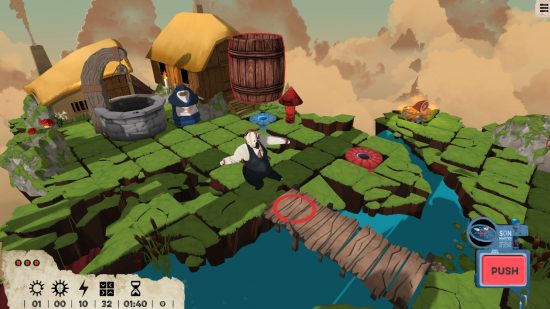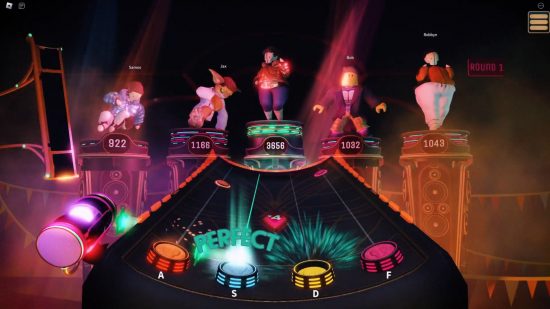We all know just how big Roblox is, but that doesn’t stop it from continuing to grow even more. In fact, to help nurture this growth, Roblox has put together a $35 million game fund, using it to encourage a wide variety of indie developers to try their hand at building a game in this blocky world. One such indie developer is Kong Orange, creator of Felix the Reaper, and, now, the rhythm rumbler Roblox game, Skullbeat.
With many of Roblox’s experiences coming from the community itself, it’s interesting to see external indie developers working on the scene and bringing their own characters and worlds to the platform. So, of course, we jumped at the opportunity to talk to Kong Orange’s CEO, Esben Kjær Ravn (along with Dario Rahmic of Chop Chop games, co-dev partner on Skullbeat) to discuss the birth of Felix, his journey into Roblox, and Kong Orange’s experiences working with the platform.
First, let’s dive into a bit of history. Felix the Reaper is a truly original game revolving around a grooving grim reaper called, you guessed it, Felix. It’s a challenging and strict 3D puzzle game about bringing humans into deadly situations and has seen very positive feedback since its release in October 2019.
When we asked what initially inspired the world and characters of Felix the Reaper, Ravn stated that “the game was originally created because a bunch of us actually held Masters in History, doing games on the side (long story), and we were super fascinated by the Dance of Death, Totentanz, or the Danse Macabre etc. We were also convinced there was a game hidden in there. That made us dive in, and also into the broad history of art about death, which is surprisingly colorful and lively.”

As such, they set out to ensure that Felix the Reaper featured all of that, “including the Death and the Maiden art tradition as well, hence Felix’s love interest in the games”. He goes on to confirm that these elements are “also featured in Skullbeat in a very subtle way.”
In terms of why Felix the Reaper received so much positive feedback, he believes that “the Felix IP proved its strength because the storyworld, the main character, and the narrative were solid, original, and eye-catching”. However, the Kong Orange team feels that they “kind of misfired with the first installment of Felix the Reaper by marrying strict puzzle game mechanics with a rich storyworld filled with dance, music, and a colorful narrative”.
They believed that, if they got another chance, the music should be at the core of the design, so they started prototyping a sequel, at which point they decided that it should be a social game as well – being around people you know and like is the best way to party, after all!
Shortly after Kong Orange began prototyping, Roblox showed up and offered the opportunity to work on the platform. Ravn explains that this felt like “a perfect match for all those ambitions”. And, of course, as an indie developer, Kong Orange doesn’t feel as though it belongs to other platforms, so it decided it was a great time to dance its way into that blocky world and bust a couple of moves.
In fact, with the big change of genre between Felix the Reaper and Skullbeat, Ravn explains that “it actually felt a bit like Felix the Reaper was coming home”. Kong Orange actually experienced “way more challenges doing the grid-based puzzler in the initial game”, and it seems like this new rhythm-rumbler genre was a natural fit for our favorite reaper.
But, with aesthetics being such an important part of Felix the Reaper’s identity, it was always going to be a challenge bringing that style over to a completely different platform – especially Roblox, which, despite offering so much freedom, still has a unique style of its own. Dario Rahimic states that “achieving the iconic aesthetic is no easy task, and translating it over to Roblox did cause some difficulties. Mainly, we set out an important goal; we wanted Roblox users to come in, and have their own avatars be able to dance on an equal footing on the dancefloor as our own original characters.”
On the technical side of things, this means that “all animations, rigs, and models had to be adapted to move in Roblox’s own systems”. While this must’ve taken some real time and hard work to get it perfect, it has resulted in a game that truly maintains that Felix the Reaper style and stands out among other Roblox experiences, allowing the characters to go “grooving on the dancefloor like they never could before.”
Of course, aesthetics aren’t the only big change when it comes to bringing Felix the Reaper to Roblox. The original is a premium game with a one-off purchase and no microtransactions, whereas Skullbeat follows the usual Roblox standard of a free-to-play game featuring Robux-based in-game purchases. However, Ravn states that, while it does “factor into the design to some degree”, in his experience so far, he “doesn’t think there has to be a big difference between content for free-to-play or premium games”.
Ravn goes on to say “I also think it’s a credit to the IP that it stands on its own across very different platforms and business models. Nonetheless, the free-to-play approach has been a natural model for Skullbeat and it has felt more like a gift than a challenge.” He explains that “the idea of having this thriving nightclub lobby, where you attract people and make it a sociable hangout between dancing and all that, really fits nicely with the free-to-play way of thinking, especially in Roblox.”
On the same topic, Ragimic states that “the main distinction between paid vs free-to-play content for us is the accessibility. In order to make the game as easily approachable for gamers of all ages, we want you to jump in and dance right away, without being met by a paywall.” As such, the shop offers earlier access to powers, cosmetics, and dance teachers, though these are also things that you can earn by just playing.
Rahimic underlines that “there is not a single piece of content in the game that’s gated behind a permanent paywall, and we have chosen this to keep the competitive integrity intact.” As such, you can use Robux to increase your currency earnings, boost your XP gains, or to purchase more song packs, but “you can’t pay to win directly, and this is important.”
In terms of the most rewarding parts of working with Roblox, Ravn says that it’s “hands down the community of players and other developers showing up in our game. It’s been such an enriching social experience and we are already super grateful after a few weeks in beta.” It goes without saying that Roblox is a massive platform that welcomes people from all walks of life, but Ravn highlights that “there’s a genuine care for the game and the detailed and meaningful feedback on our Discord and also the social interactions with and between players in the game has been incredibly rewarding” – he even goes so far as to say “going from premium games to that has made me pretty sure we are not going back to non-social games anytime soon.”
Skullbeat was in the works for just over a year prior to the beta release. When discussing the journey so far, Ravn states “having done a live game in a year with a small team, we can’t complain. It hasn’t been a breeze, no game productions are, but it’s been absolutely doable.” With the beta ready just in time for RDC, they decided it would be a cool idea to shadow-drop the Skullbeat release date during the event “to get a core Roblox community without stretching [their] bandwidth doing a giant load of marketing.” This allowed the team to keep focusing on developing the game as players started coming in after RDC.
Talking about continued development, when we asked whether there were any future content updates planned for Skullbeat, Ravn confirmed that “there absolutely are. We’ll be adding more music, more hardcore challenges for experienced rhythm gamers, some Halloween stuff and also more disruptions.” Exactly when, how, and what is under wraps for now, but we should learn more soon – so keep your eyes out!

Similarly, we asked what’s next for Kong Orange, and Ravn hinted that they are “working on another game on the side already for other platforms”, and that they’re “absolutely not against” working with Roblox again in the future – on the contrary, it’s been “quite fulfilling so far”, but they don’t have any plans just yet, as they’re still in beta with Skullbeat. Beyond more content, Kong Orange is also looking to expand both core leadership teams as it moves into the live game scene more fully, with Ravn stating “there’s a lot happening right now, and it’s mega exciting!”
And, with that, our chat with Esben Kjær Ravn and Dario Rahmic comes to an end – on the promise of more to come. Pretty poetic when you think about it, just like Felix’s job. Be sure to check out Skullbeat and Felix the Reaper today, and watch out for any exciting new Roblox games coming to the platform. Oh, and be sure to check out our list of Roblox game codes – you might just find some freebies for your favorite experiences.


